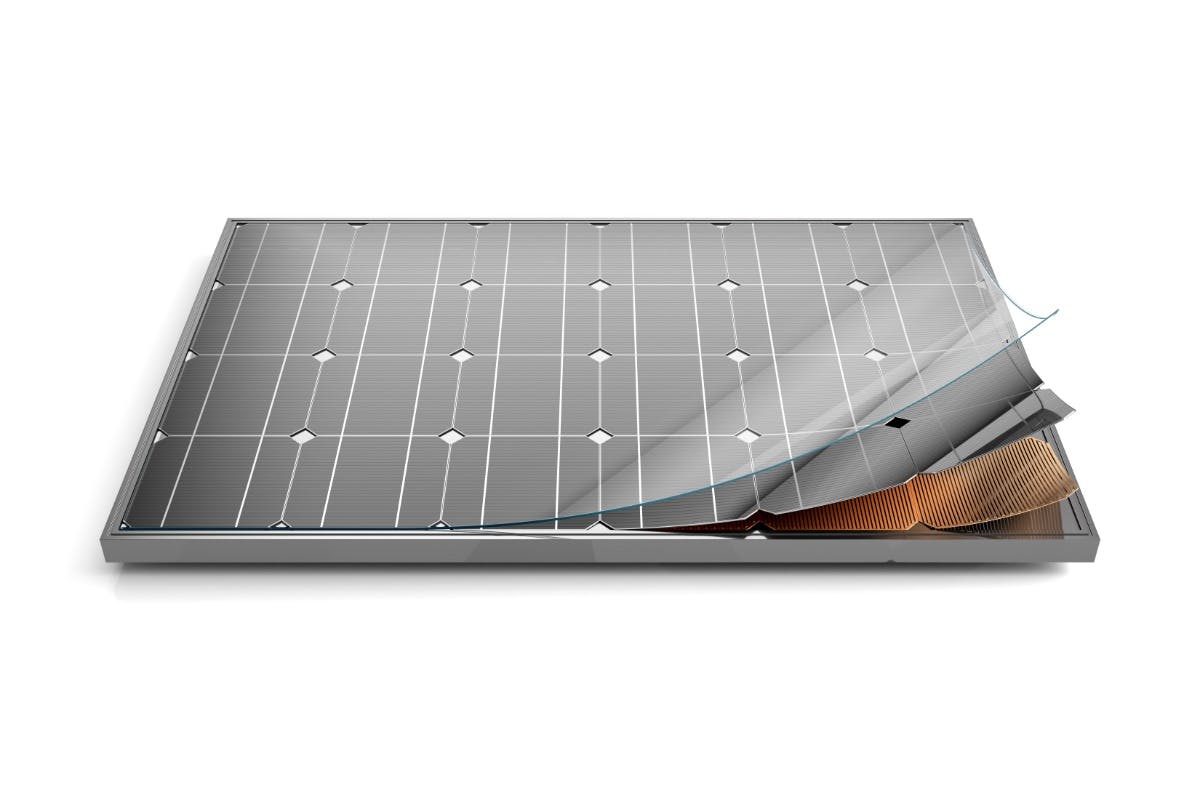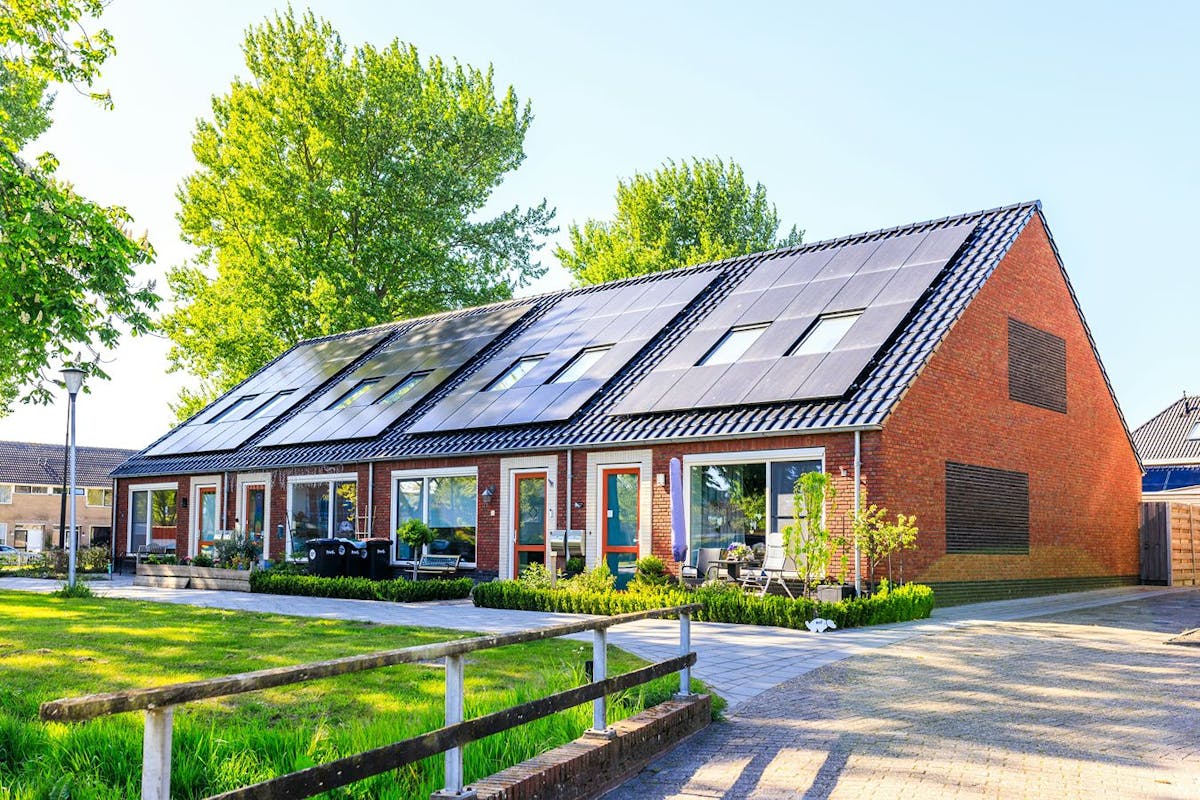Solar Panel Efficiency in 2025: Do You Need the Most Efficient Panels?
Last edited
Author
Andrew Blok
Electrification and Solar Writer and Editor
Editor
Andrew Giermak
Solar and Electrification Writer and Editor

Solar panels turn sunlight into electricity. The more efficient they are, the more electricity they generate. But what determines that efficiency? What is a good solar panel efficiency? And how important is efficiency in home solar panels?
This article answers those questions and more, including a look at the most efficient solar panels available, and what more efficient solar technology the future might hold.
See how much you can save by going solar with Palmetto
What Is Solar Panel Efficiency?
Solar panel efficiency is the percentage of solar energy available to a panel that it can turn into electricity for your home. How efficient are solar panels? Modern solar panels are typically around 20% efficient, though some can reach 24% or higher.
That may not sound like a very good number but, even at current efficiencies, solar panel installations can generate enough electricity to do the job, whether that’s supplying the grid with power or taking a bite out of your electric bill.
Solar panel efficiency has also been on the rise. A decade ago, very few residential solar panels used modules with efficiencies greater than 20%. Today, the vast majority do, according to the Lawrence Berkeley National Laboratory.

Credit: LBNL
Solar panel efficiency is even higher if you consider solar panels that haven’t made it out of research yet. According to the National Renewable Energy Laboratory, solar panels under research have reached efficiencies of nearly 50%.

Credit: NREL
Most Efficient Solar Panels
The most efficient residential solar panels have efficiency ratings of 24% or higher. They may not be widely available and you can likely meet your energy goals without the most efficient panels.
Here’s how some widely installed residential solar panels stack up in terms of efficiency.
| Manufacturer | Panel Series | Size (watts) | Efficiency rating |
|---|---|---|---|
| Canadian Solar | CS1Y | 405 | 20.10% |
| Canadian Solar | CS6.1-54TM | 460 | 22.50% |
| JA Solar | JAM54S31 | 405 | 20.70% |
| Jinko | Tiger Neo | 445 | 22.27% |
| Longi | Hi-MO 5 | 415 | 21.30% |
| Maxeon | SPR-MAX6 | 440 | 22.80% |
| QCells | Q.TRON BLK M-G2+ | 440 | 22.50% |
| REC | Alpha Pure-RX | 470 | 22.60% |
| Silfab | Prime NTC | 440 | 22.60% |
| Trina | Vertex S+ | 445 | 21.80% |
| VSUN | 108BMH-BB | 430 | 22.02% |
Solar Panel Efficiency and Cost
The most efficient solar panels may cost a premium, like any cutting edge technology. That can be worth it if you’re lacking space and want to squeeze all the electricity possible out of your solar panel array.
In other instances, you might be able to generate the same amount of electricity for a smaller total cost by installing one or two more less efficient solar panels.
See how much you can save by going solar with Palmetto
What Affects Solar Panel Efficiency?
Different solar panels have different efficiency ratings for a variety of reasons, from their chemistry to how well they’re installed.
Age
Solar panels lose efficiency as they age. Manufacturers warranties often guarantee that after 25 years, panels won’t lose more than 8-15% of their rated production capacity.
Chemistry
The actual make up of solar cells — the part of the panel that generates electricity — affects a panel’s efficiency. For example, most residential solar panels are monocrystalline panels, but there used to be more polycrystalline panels installed. Monocrystalline panels are much more efficient.
Construction
How a panel is put together affects its efficiency. A homeowner probably doesn’t need to know whether a panel is a TOPCon or PERC or other type of panel, but those characteristics do affect efficiency.
Heat
Solar panels become less efficient at high temperatures. Panels may be less efficient during a summer afternoon than during a morning, even if they’re producing more because they’re receiving more sunlight.
Installation
Solar panels have an efficiency rating, but you could also measure the efficiency of the entire solar system, including wiring, inverters, batteries, and more. An improperly installed solar array may have lower efficiency as a whole. It’s one of the reasons it’s important to work with a reputable solar company.
Do Solar Panels Get Less Efficient?
Yes. Over time, solar panels lose some of their efficiency. It’s a normal part of aging for solar panels.
Manufacturers provide warranties that guarantee they won’t degrade too quickly. Typical warranties say panels will still produce about 85-90% after 25 years, depending on the panel and manufacturer.
How to Improve Solar Panel Efficiency
A solar panel's efficiency is set once it’s been manufactured. You can’t make it more efficient.
However, you can do a couple of things to ensure your solar panels generate the most electricity possible.
- Get a quality installation: If your panels are installed poorly, they likely aren’t delivering as much electricity as possible.
- Clean them: Periodic rains are usually enough to keep panels free of dirt. If it’s been dry for a while, gently rinsing your panels with a garden hose from ground level can remove dust and grime that can block sunlight from reaching the panels. Getting rid of it can boost your electricity production.
Do I Need the Most Efficient Solar Panels?
Should you hold out for the most efficient solar panels for your home? Or, should you wait for solar technology to improve? In both cases, the answer is probably no.
For most people who go solar, the first goal is saving money. If highly efficient solar panels cost a premium and don’t boost your total savings, you’ll end up paying more without saving more.
Similarly, if solar panels can save you money today, there’s little reason to wait for solar technology to improve now. Start saving money with solar today and put those savings to work electrifying your home or improving its efficiency.
See what solar can do for you:
Frequently Asked Questions
Can solar panels be 100% efficient?
No. Some energy is always lost in a system, especially one that exists outside of a laboratory. Some solar technologies have theoretical limits to how efficient they can be, though solar panel researchers haven’t reached them yet.
What does solar panel efficiency mean?
Solar panel efficiency is a measure of how much solar energy a panel turns into electricity. It’s expressed as a percentage. Residential solar panels typically have efficiencies around 20-24%.
Are efficient solar panels more expensive?
They can be. If you’re going solar to save money, paying a premium for the most efficient solar panels available may not be worth it if it doesn’t also boost your savings.


